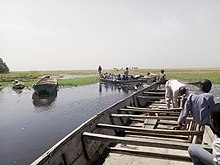Yobe State
The State's agricultural produce include gum arabic, groundnuts, beans, and cotton.
The State also has one of the largest cattle markets in West Africa, located in Potiskum.
[12][13] The major ethnic groups living in Yobe state are the Kanuri and Kare-kare, Fulani, while other ethnic communities include Bolewa, Ngizim, Bade,Ngamo, Shuwa, Bura, Marghi, Hausa and Manga.
The 1067 mm Cape gauge Western Railway Line northeast from Kano via Jigawa State terminates at Nguru.
Potiskum Airstrip The inhabitants of Yobe are mainly Muslims and Sharia law was established in the state in 2000 by governor Bukar Abba Ibrahim.
[24] The state government is headed by a governor who is elected through a democratically process.
[26] The state's administration has improved healthcare delivery lifted a moratorium on hiring and provided incentives for staff retention.
[27][28][29] Residents of Yobe State in northern Nigeria are worried about desertification because it could have a negative impact on their quality of life.


